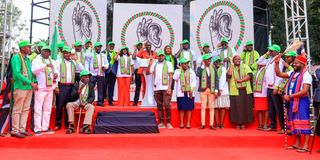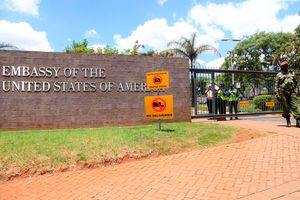
Former Deputy President Rigathi Gachagua (in red suit) with other officials during the unveiling ceremony of Democracy for the Citizens Party (DCP) in Lavington, Nairobi on May 15, 2025.
A new genre of authoritarianism in Kenya is testing to the limit the tenets, principles, and science of public governance. The country’s political elite has cobbled the world’s strangest mongrel governments. ‘Mongrel government’, experts say, are a blend of parliamentary and presidential systems.
But the Kenyan elite is pushing the envelope mongrel governments, sealing power-sharing deals between the government and opposition. Kenya’s genre of ethnic-based mongrel governments has enfeebled the opposition and spurred the emergence of authoritarian and extortionist political party system.
An obnoxious culture of ethnic-based horse-trading ahead of presidential elections is entrenching and localizing a subtle form of authoritarianism, which appear far more worse and more brutal and violent than the despotism of the one-party era.
Political parties are indispensable in modern governance. Parties have two faces, reflecting their dual purpose. They are vehicles for electing citizens to public offices. After elections, parties are expected to champion development, unity and cohesion. Beyond this duality, parties are like the proverbial “water of life”. Kenyan singers, inspired by the biblical story of bitter water in the wilderness of Shur during the Israelites exodus (15: 22-27), have often used the biblical imagery of Mai ni Maruru as a protest against economic, political and moral decay traceable to the leadership of political parties.
Unveiling political parties
Ahead of the August 10, 2027 elections, Kenya’s political class is forming, refurbishing, oiling and unveiling political parties ready for the race. On May 15, 2025, former Deputy President Rigathi Gachagua unveiled his brand new party, Democracy for the Citizens Party (DCP), ahead of the formal launch during the delegates conference slated for June 4, 2025. Eugene Wamalwa also launched his new Democratic Action Party of Kenya (DAP-K) on January 27, 2025. On February 25, 2025, the iron-lady of Kenyan politics, Martha Karua, launched the People’s Liberation Party (PLP), a rebranding of her Kibaki-era Narc-Kenya to move to a people-centred agenda.
Former Interior and Coordination of National Government Cabinet Secretary Fred Matiangi, who formally declared his intention to run for the presidency in 2027, is also expected to unveil his electoral vehicle soon. But he faces serious headwinds if he decides to run on President Uhuru Kenyatta’s Jubilee Party. In what is a clear move to ring-fence the populous Mount Kenya for his new party, during the launch of DCP, Gachagua threw a salvo at Matiangi, asking him to reject Kenyatta’s party as his election vehicle for 2027, and instead to form his own outfit for the purposes of negotiations within the opposition coalition.
This sounds like a real death knell for Kenyatta’s party, which would have gotten a new lease of life by fronting Matiang’i as its flag presidential bearer at a time he is gaining popularity in pockets of Mount Kenya amid uncertainty around Gachagua’s candidacy.
Kenya’s elite are going for the hearts and minds of the Kenyan people, stirring a new wave of populism reminiscent of Daniel Moi’s “Wanjiku” or Kenneth Matiba’s “Let the People decide.” Kenya’s post-independence dream of a mass nationalist party soon collapsed under the weight of ideological rifts and geopolitical tensions, giving way to autocratic rule and later a multiparty system that failed to deliver genuine democracy.
Kenya’s neo-nationalists crusading for multiparty democracy saw the return of many parties as a potent cure for one-party ills. They trained their guns on Section 2A of the 1963 Elizabethian Constitution on which KANU’s one-party dictatorship was hoisted. But their multiparty-equals-democracy thesis was false and deceptive. The long 1992-2002 decade turned into a wilderness of the bitter waters of parochial party politics.
Hunting dogs
The original Forum for the Restoration of Democracy (Ford) died before its second birthday. The mighty Kanu fell to the Mwai Kibaki-led National Rainbow Coalition (NARC). Democracy has since been trapped in new ethno-nationalist parties, which have proliferated like virus. By May 2025, Kenya boasted of over ninety (90) fully registered political parties, according to the Registrar of Political Parties.
It is the idea of the ‘political-party-as-hunting-dog’ that drives Kenya’s political class to form and launch new parties. In this bizarre trope, politicians are the hunters, political parties the hunting dogs, and public institutions the game being hunted. In this power game, the “first-dog-to-bite” rule applies: only those with a dog in the hunt get a share of the meat, and the owner of the dog that takes the first bite claims the lion’s share!
Because Kenya is manifestly a country of ethnic minorities, no single ethnic-based party can win a presidential election. From this stubborn reality has emerged a political culture of ethnic horse-trading ahead of every election cycle. This is Kenya’s version of a political Black Friday, where party owners unabashedly parade their ethnic numbers to strike favourable deals and secure top seats in coalitions. ‘What are you bringing to the table?’ is the common refrain in these ethnic bargaining rituals.
This logic has localised and intensified Kanu-era despotism, increasing cronyism and corruption within ethnic spaces. Parties should unveil new agendas to spur development, not to entrench localised tyranny.
Prof Kagwanja is a former Government Adviser and currently Chief Executive at the Africa Policy Institute (API)










